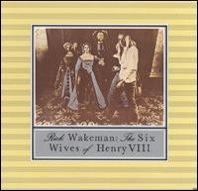
Rick Wakeman
Six Wives Of Henry VIII
It says in the fine print of Rick Wakeman's first solo album that the music is "based around [my] interpretations of the musical characteristics of the wives of Henry VIII." The idea for the album came from the book of the same name, which Yes' Wakeman purchased at a London airport. He writes that the music for each of Henry's wives came flowing inside his head as he read about them. A bit apocryphal perhaps, but apparently Wakeman found what he was looking for -- a theme through which he could expose his keyboard virtuosity. He overdubbed eight of them: Mini-Moog synthesizer, mellotron with brass and string effects, a Steinway Grand piano, another mellotron with voice effects, C-3 Hammond organ, RMI electric piano, Arp synthesizer and a Thomas Goff harpsichord.
Placing himself in the middle of these various keyboards, Wakeman created a synthesized orchestra. Along with a rhythm section often composed of Yes' Chris Squire on bass, Steve Howe on guitar and the group's recently acquired drummer Alan White, he used the electric piano to take the place of strings, the electric harpsichord to replace the sound of reeds, and the Arp to replace a contra bassoon.
With this album, Wakeman has made his bid for Keith Emerson's place as the master of keyboard electronics. Though falling a little short in technique, he has a brilliant feel for tasteful impressionistic composition. For example, "Catherine Of Aragon," at first sounds like ELP's "Tarkus," but evolves into a more melodic cut featuring some human choral work by Liza Strike, Barry St. John and Judy Powell.
Rick Wakeman The brightest spot on the album is "Catherine Howard," which contains at least four time changes and some amazing interplay between mellotron, harpsichord, Moog and acoustic piano.
Henry VIII is an exceptionally interesting instrumental album. The production is superb, the mixing tasteful with hardly an uncomfortable studio effect. In fact, most of what we would normally think of as effects are the product of Wakeman's own playing which is just fine.
Steve Apple, Rolling Stone, 6/21/73
